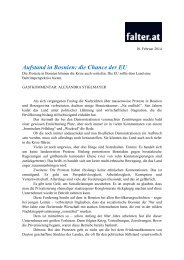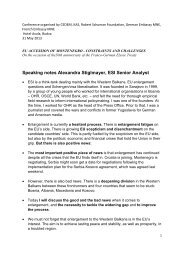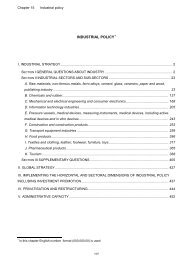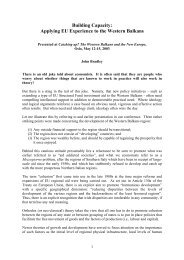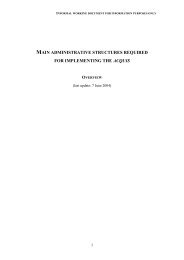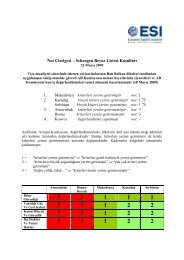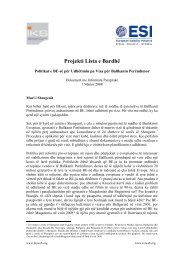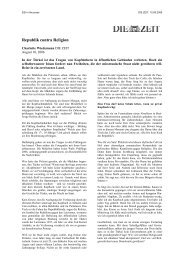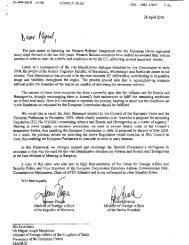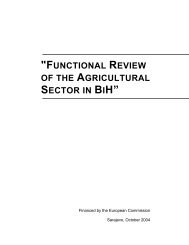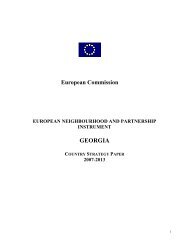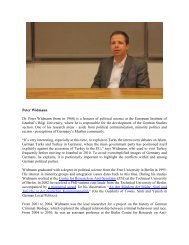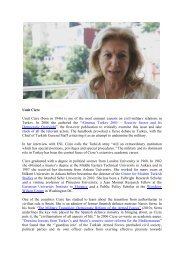MURDER IN ANATOLIA - European Stability Initiative - ESI
MURDER IN ANATOLIA - European Stability Initiative - ESI
MURDER IN ANATOLIA - European Stability Initiative - ESI
Create successful ePaper yourself
Turn your PDF publications into a flip-book with our unique Google optimized e-Paper software.
– 28 –<br />
Mehmet Ulger was the Malatya Gendarmerie Commander between January 2006 and July<br />
2008. Testifying on the same day as Ruhi Abat, he told the court that he had met Abat in<br />
2006 at a workshop on missionary activities. Ulger explained that his contacts with Abat<br />
were related to a seminar and the preparation of a conference. Ulger claimed to have called<br />
Abat to inquire about a document he had found, which was written in Arabic. 193 He<br />
explained: “My business meetings continue 24 hours a day. I don‟t remember whether I<br />
talked to Ruhi Abat from the office or from home. It might be that he called me at 11:30 at<br />
night.” 194 The lawyers of the victims‟ families were not convinced. Police had established<br />
that 1,415 phone calls had been made between Abat and the gendarmerie within a few<br />
months. 195 Why so many phone calls? Ulger explained that many calls were made by the<br />
gendarmerie “in order to obtain information from a faculty member.” 196<br />
Mehmet Ulger also described the gendarmerie‟s general interest in missionary activities:<br />
“Within the gendarmerie, according to general characterizations, missionary activities are<br />
considered as „extreme right‟. They are not considered a crime. The gendarmerie‟s<br />
interest in missionary activities is the same as in other extreme right-wing and Islamist<br />
activities.” 197<br />
Ulger said that he had heard about missionary activity in Turkey, but that he did not even<br />
know whether any took place in Malatya.” 198 He claimed that “during this period there was<br />
no research on missionary activities.” 199 Of Ruhi Abat, Ulger told the court in Malatya, “No,<br />
he is no informant. There has been no payment at all to him.” 200<br />
Ulger was then also asked about the testimony of another witness, Veysel Sahin. Sahin had<br />
been arrested in May 2008 when hand grenades and explosives were found in his home. 201<br />
Sahin, having spoken with Malatya prosecutors in December 2008, told them that he had<br />
moved to Malatya in November 2005 to open an office of the Iraqi Turkmen Front. 202 He<br />
claimed to have met Mehmet Ulger at the Iraqi Turkmen Front‟s office in March 2006. Ulger,<br />
he recalled, arrived wearing civilian clothes. Sahin recalls that Ulger also introduced himself<br />
as a business partner of the Malatya Arena Book Cafe.<br />
193 Protocol of the 16 th Court Hearing, 13 April 2009, p. 15.<br />
194 Protocol of the 16 th Court Hearing, 13 April 2009, p. 15.<br />
195 Protocol of the 16 th Court Hearing, 13 April 2009, p. 15. The court had ordered the police to investigate the<br />
phone conversations between Ruhi Abata and the Malatya gendarmerie (Mehmet Ulger).<br />
196 Protocol of the 16 th Court Hearing, 13 April 2009, p. 15.<br />
197 Protocol of the 16 th Court Hearing, 13 April 2009, p. 14. Discussing the role of the gendarmerie columnist<br />
Ali Bayromoglu wrote: “Following February 28 [1997], the military took over posts traditionally controlled by<br />
the police and the governors. The gendarmerie moved from the rural area to the urban area. Security and Public<br />
Order Assistance Squads (Emniyet Asayis Yardimlasma Birlikleri, EMASYA) obtained authority above that of<br />
the governor. A domestic security structure has been established that posits society itself as being the greatest<br />
threat … Moreover, the power to gather intelligence in a country should not be in the military‟s hands. Today, it<br />
is the military bureaucracy that defines what threats exist, it is the military that gathers intelligence, assesses<br />
social incidents and bases all of its findings on internal security documents and not legal criteria.” Quote in<br />
“Almanac Turkey 2005 – Security Sector and Democratic Oversight”, DCAF-TESEV Series in Security Sector<br />
Studies, September 2006.<br />
198 Protocol of the 16 th Court Hearing, 13 April 2009, p. 16.<br />
199 Protocol of the 16 th Court Hearing, 13 April 2009, p. 14.<br />
200 Protocol of the 16 th Court Hearing, 13 April 2009, p. 16.<br />
201 As of December 2009 he is serving a 29 year prison sentence for armed assault and illegal possession of<br />
firearms and dangerous materials. Malatya Guncel, “Veysel Sahin‟e ceza yagdi”, 15 December 2009,<br />
http://www.malatyaguncel.com/news_detail.php?id=33677&uniq_id=1289319512.<br />
202 The Iraqi Turkmen Front is the biggest party of the Turkmen (Turkish) minority in Iraq.<br />
~ www.esiweb.org ~



